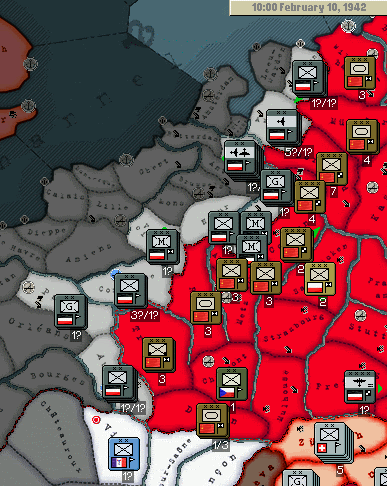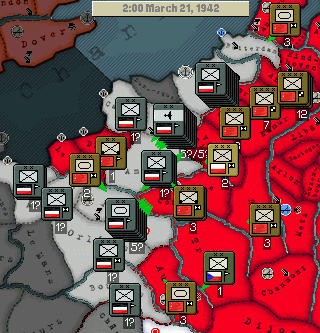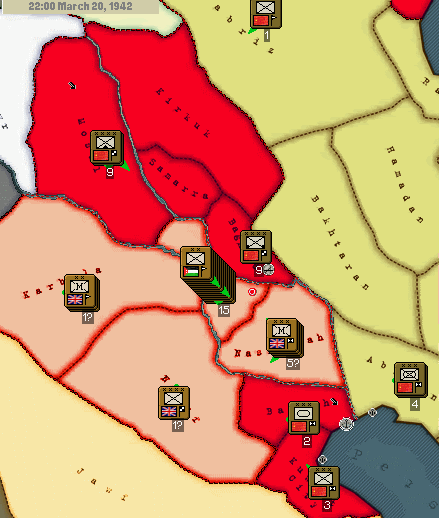20 October 1941 – 10 February 1942 The Decline and Fall of Rome
On 30 October Copenhagen finally fell after repeated assaults. With his city under siege for several months, the King of Denmark had plenty of opportunity to ponder the future of his people. In a short meeting he told his liberator, General Kork, he had come to understand the benefits communism would bring to his country. 1 November the king announced both his abdication and the formation of the Socialist Republic of Denmark. In Norway, Chuikov made several attempts to take Narvik, but since these achieved but limited gains, it was decided to postpone further attacks until spring.
In the last months of 1941, the German front settled down to an almost standstill. Only in the south were some limited offensive actions fought. Dijon was liberated by Zhukov in December, and Reims fell to Vassilevskij’s tanks 4 February.
In the last weeks of November, a series of hard battles was fought around La Spezia as the Italian forces in North Italy attempted to break out of their encirclement. The result was that La Spezia had to be abandoned and recaptured twice in little more than a week, and during this many Italian divisions escaped southwards, prolonging their own misery. With the liberation of Genoa 5 December, only a hodgepodge of Italian, German and Slovenian troops were now left to defend the pocket. On the 25 December the last remnants finally surrendered at Turin.
The Bulgarian government had finally capitulated 1 January, and the Balkan Front, commanded by General Kalinovski, could finally begin the advance into Greece. Surprisingly many Italian troops were found to be garrisoned here, and although this made Soviet advance somewhat slower, it meant that fewer troops remained to resist the coming onslaught in Italy itself. As elsewhere nothing could stop the Red Juggernaut. Salonika was liberated 29 January.
On 7 January 1942, what was intended first as a limited offensive was launched with the goals of capturing Rimini and Florence. Both of these cities fell after offering considerably less resistance than expected. Timoshenko, Primakov and Apanasenko were therefore ordered to continue the advance while the enemy was off balance. The Italian retreat turned first into a complete rout and then into mass surrendering. At Rome the pitiful defence offered by the enemy General Graziani was easily brushed aside, and 17 January Meretskov’s army entered the Eternal City. The by now desperate Italian government ordered divisions flown in from Libya, only to see them destroyed only days after arrival. Naples fell 25 January, and on 30 November the Red Army entered Reggio. All of mainland Italy had now been liberated and Mussolini had fled with his mistresses to Palermo.
On 21 January the United States of America, the so called “Home of the Free”, formally entered into alliance with Britain. The US sent financial aid for some time, now the Americans would also send their sons to die under the Libyan sun. Stalin was greatly pleased by this turn of events. It would lead to much less unnecessary diplomatic paperwork in the future.
During the last year, the Persians had sent countless letters to Moscow describing the miserable conditions under which their brothers in Afghanistan were living. Finally Stalin could bear this no more, and in late November the great work of freeing the Afghani people from their feudal overlords was begun. With the exception of a few misguided tribal warriors, our brave soldiers were met with flowers everywhere.
After the great success in Afghanistan, it was decided that the suppressed and misruled people of Iraq could no longer be denied the joys of socialism either. But while earlier, the rest of the world had watched the events with silent consent, the British and American embassies begun delivering piles of letters filled with bile and vile accusations.
Thus it was that Stalin in the morning of 10 February 1942 held one of his greatest and most important speeches. He begun with detailing how the Soviet Union had been attacked by the fascist conspiracy without any provocation, and then described all the great victories that had followed and how the fascists now were mere months if not weeks from being pushed into the sea. He spoke about all the numerous peoples who had been liberated from their oppressive overlords and had all freely embraced the tenets of communism. He told how the Imperialist English and Frenchmen, with the backing of American capital, had for over a century hold the countless millions of Asia and Africa in near slavery and was even now planning the same fate for the peoples of Arabia. Then, to the never ending cheers and applause of the crowd, he proclaimed that the Ever Victorious Red Army had at his orders, begun the march into Iraq and India this very morning. “I promise you, Comrades, that Capitalism and Colonialism will Perish for ever!”







